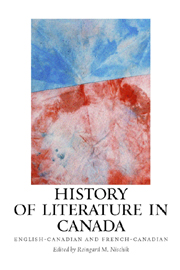Book contents
- Frontmatter
- Contents
- Acknowledgments
- Introduction: Writing a History of Literature in Canada
- I Beginnings
- II The Literature of New France, 1604–1760
- III The Literature of British Canada, 1763–1867
- IV From the Dominion to the Territorial Completion of the Nation, 1867–1918
- V The Modern Period, 1918–1967
- 11 Politics and Literature between Nationalism and Internationalism
- 12 English-Canadian Poetry, 1920–1960
- 13 The English-Canadian Novel and the Displacement of the Romance
- 14 The Modernist English-Canadian Short Story
- 15 Early English-Canadian Theater and Drama, 1918–1967
- 16 French Canada from the First World War to 1967: Historical Overview
- 17 French-Canadian Poetry up to the 1960s
- 18 The French-Canadian Novel between Tradition and Modernism
- 19 The French-Canadian Short Story
- 20 French-Canadian Drama from the 1930s to the Révolution tranquille
- VI Literature from 1967 to the Present
- Further Reading
- Notes on the Contributors
- Index
14 - The Modernist English-Canadian Short Story
from V - The Modern Period, 1918–1967
Published online by Cambridge University Press: 12 September 2012
- Frontmatter
- Contents
- Acknowledgments
- Introduction: Writing a History of Literature in Canada
- I Beginnings
- II The Literature of New France, 1604–1760
- III The Literature of British Canada, 1763–1867
- IV From the Dominion to the Territorial Completion of the Nation, 1867–1918
- V The Modern Period, 1918–1967
- 11 Politics and Literature between Nationalism and Internationalism
- 12 English-Canadian Poetry, 1920–1960
- 13 The English-Canadian Novel and the Displacement of the Romance
- 14 The Modernist English-Canadian Short Story
- 15 Early English-Canadian Theater and Drama, 1918–1967
- 16 French Canada from the First World War to 1967: Historical Overview
- 17 French-Canadian Poetry up to the 1960s
- 18 The French-Canadian Novel between Tradition and Modernism
- 19 The French-Canadian Short Story
- 20 French-Canadian Drama from the 1930s to the Révolution tranquille
- VI Literature from 1967 to the Present
- Further Reading
- Notes on the Contributors
- Index
Summary
IN ITS MAIN LINE OF DEVELOPMENT, the English-Canadian short story is a relatively recent literary phenomenon, spanning a little more than a hundred years to the present. It began to coalesce as a national genre in the 1890s, with writers such as Isabella Valancy Crawford, Susan Frances Harrison, Ernest Thompson Seton, and Charles G. D. Roberts. Yet it was only with the advent of the modernist short story in the 1920s that the English-Canadian short story fully emerged as a distinct literary genre, and with the works of Morley Callaghan and others joined the realm of world literature.
The modernist development of the English-Canadian short story is closely connected to the life and works of Raymond Knister (1899–1932). Knister was important in the genre's early stages as well as in the development of Canadian literary modernism in general. His importance in regard to the Canadian short story rests on his contributions to the poetics of the Canadian brand of the genre, on his early attempts — as editor of Canada's first anthology of English-Canadian short stories — to create a canon of the genre, and on his own short-story production.
In “Democracy and the Short Story” (written in 1920, first published in 1975), Knister emphasizes the unrivaled excellence of the contemporary American short story and relates its significance to the large number of short stories published in the United States and their distribution in widely circulating popular magazines.
- Type
- Chapter
- Information
- History of Literature in CanadaEnglish-Canadian and French-Canadian, pp. 194 - 206Publisher: Boydell & BrewerPrint publication year: 2008



